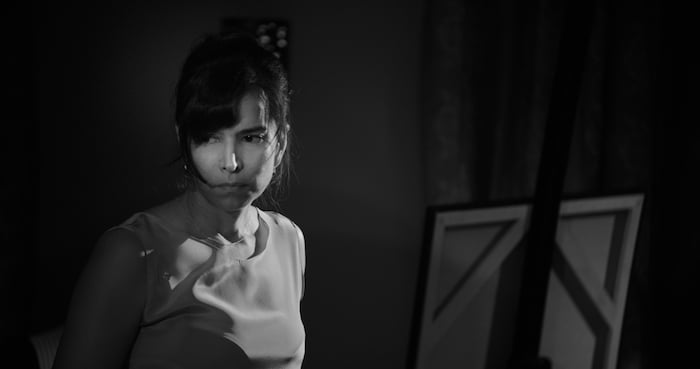In the indie film “Guys Reading Poems,” Patricia Velásquez plays a mother and painter, abandoned by her cheating husband, who has a mental breakdown and locks her young son in a puppet box, which she then turns into an art installation.
Velásquez is scheduled to attend tonight’s screening at Arena Cinelounge in Santa Monica.
The role is another dramatic turn for the Venezuelan-born actress, who was a Sports Illustrated and Victoria’s Secret model and also strutted down fashion catwalks before her roles in “The Mummy” and “The Mummy Returns.”
In 2014, Velásquez played a terminally ill lesbian who bonds with a woman who lost her son to cancer. The following year, Velásquez came out in her memoir, “Straight Walk.”
Away from acting, Velásquez founded The Wayúu Taya Foundation, which is focused on helping the Wayúu and improving the living conditions of the Latin-American indigenous populations, while respecting and preserving their traditions, cultures and beliefs.
In an interview with Q Voice News, Velásquez, 46, talks about working with director Hunter Lee Hughes on “Guys Reading Poems” and how coming out impacted her career.
On why she wanted to work on “Guys Reading Poems”
“What got me to do the film was Hunter. I’ve known him for quite a while,” Velásquez said. “He’s the kind of human being who’s daring and not afraid to go outside the box. He has his own ideas on how to do things. He’s different.
“Hunter wrote me a letter about the intent of this character, and I said, I get it. He talked about the relationships of mother and son. At the end, what he wrote about in the letter was forgiveness. I identified with that forgiveness. It wasn’t my case, because I had a great mom, but it happens to a lot of people. They have parents that make mistakes. Nobody teaches you how to be a parent.
On playing a character who locks her son in a box
“When you see a woman who locks her son in a box, it seems like the worst thing in the world,” Velásquez said. “How do I justify that? The only way she could save him from her was to put him in the box. She was too damaged. She is mentally ill.”
On working on a film that has a nonlinear story, uses poetry as dialogue and is filmed in black and white
“It’s everything that’s not commercial. This is where the years of knowing each other come into play,” Velásquez said. “It could have been terrible. It’s very complicated. When we were shooting, Hunter knew what he wanted, and he’s a great listener. He also surrounded himself with people he admired.
“At the core of it, I had to walk into that project with trust. I did. I never thought for a minute that it wouldn’t be wonderful. I love black and white, and poetry and the story.”
On what happened after she came out as a lesbian
“It was a concern, which is is why it took me a long time to come out. I live my life very freely, so I didn’t have to change anything. It wasn’t until I shot this film ‘Liz in September’ that I finally understood that I have a responsibility to other people,” Velásquez said. “I have a foundation that saves thousands of children Venezuela, but there was another cause. This cause is my identity because there are thousands of people like me who feel they can’t express themselves fully. I wrote my book, and put it out.
“It’s helped so many people in the Hispanic world, and my work hasn’t been impacted at all, not at all. Completely the opposite. I have more work now,” she said.
“The figure of the macho men in our culture and family makes it very challenging to come out. We believe we will not be accepted because of the macho culture,” Velásquez said. “We are in the United States, a developed country. In some of the the Latin American and South American countries, like Venezuela, we are still dealing with very basic issues of human rights, food and electricity. To talk about sexuality seems so developed when they are trying to just put food on the table.
“One thing I can do for people is put my word out there and help them feel they are understood and they are not alone,” Velásquez said. “If you know there are others like you who have been through it, it might be a light at the end of the tunnel and empower them to have courage to believe in themselves fully.”

In the indie film “Guys Reading Poems,” Patricia Velásquez plays a mother, abandoned by her cheating husband, who has a mental breakdown and locks her young son in a puppet box, which she then turns into an art installation.
Velásquez is scheduled to attend tonight’s screening at Arena Cinelounge in Santa Monica. Photo: “Guys Reading Poems.”
